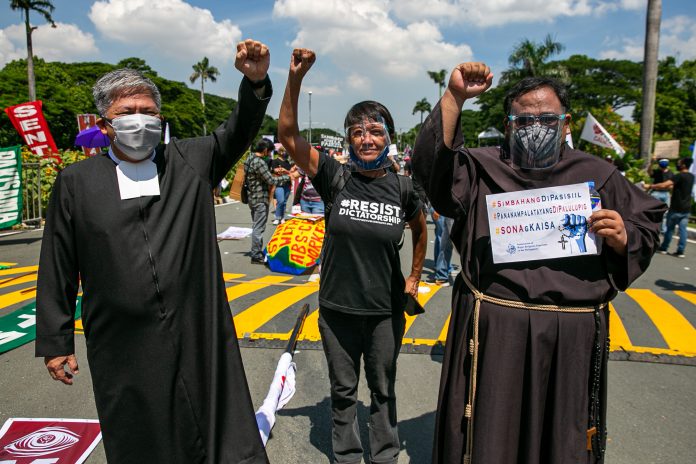The spokesman of the Catholic Bishops Conference of the Philippines, Father Jerome Secillano, is correct in pointing out that the principle of “separation of Church and State” enshrined in Sec. 6, Article II, or the Declaration of Principles and State Policies” of the 1987 Constitution is actually directed at the State.
The priest explained that the principle “doesn’t actually bar Church leaders from expressing their political opinions…. If the Church does not anymore speak about all these matters and there are wrongs being committed left and right, then we cease to exist as a Church.”
What the “separation of Church and State” really means, from where we sit, is that the government should not favor one church over others by establishing a state religion or by allocating taxpayers’ money to favor one church.
In fact, Article III, Section 5 declares, “No law shall be made respecting an establishment of religion, or prohibiting the free exercise thereof. The free exercise and enjoyment of religious profession and worship, without discrimination or preference, shall forever be allowed. No religious test shall be required for the exercise of civil or political rights.” This is a carry-over from Article IV, Section 8 of the 1973 Constitution.
What the “separation of Church and State” also means is that the government cannot tell the citizenry what to believe in, it cannot “control” religion, and it cannot decide what should be their doctrines or who should be their officials and personnel.
Neither can the government object to symbols of faith being present in the public realm, or having religious elements in the cultural sphere.
The church official was reacting to the statement by the chief presidential legal counsel denouncing a recent pastoral letter issued by the CBCP that “appears to have violated” the constitutional principle of “separation of Church and State.”
The CBCP pastoral letter called out the Duterte administration’s “pattern of intimidation” with the recently enacted Anti-Terrorism Law that contains an overbroad but vague definition of terrorism and legalizes warrantless arrests and prolonged detention of suspected terrorists.
As of now, no less than 17 petitions have been filed by various groups before the Supreme Court to declare the new law as unconstitutional.
Manila Archdiocese Apostolic Administrator, Bishop Broderick Pabillo, has even challenged the palace official to file charges against church leaders: “Don’t we have the right to speak out on government’s failings?”
The Catholic bishops’ strong opposition to the anti-terrorism law is supported by the National Council of Churches in the Philippines, which brings together various Protestant churches in the country.
Bishop Reuel Norman O. Marigza, NCCP general secretary, said: “It is the moral duty and prophetic task of every Christian, especially church leaders, to… denounce the ills of society.”
Christian Monsod, one of the framers of the 1987 Constitution, has also emphasized that “priests and bishops, as citizens of the country, have the right to freedom of speech.”
The Church has long denounced State repression of legitimate dissent, especially outrage over the brutal and bloody war on drugs that has led to the killing of thousands of alleged drug suspects.
It is well within its right to do so.
Even before he became president, Duterte, had shown utter contempt for the constitutional principle of the separation of Church and State when he openly attacked Catholic beliefs and provoked violence against outspoken bishops.
Given this, we ask: When should the Church speak out?
The Church should speak out whenever the government neglects its prime duty to serve and protect the people.
The Church should speak out whenever the government fails to maintain peace and order, protect life, liberty and the promotion of the general welfare.
The Church should speak out whenever the government abdicates its responsibility to free the people from poverty through policies that provide adequate social services, promote full employment, a rising standard of living, and an improved quality of life for all.
The Church should speak out whenever the government shirks its responsibility to redress social injustice.
The Church should speak out whenever the government does not accord full respect for human rights and fundamental freedoms, such as freedom of speech, of expression, of the press, or the right of the people to peaceably assemble for redress of grievances.
And the Church should speak out whenever the government disregards due process of law and suppresses legitimate dissent.
Ernesto M. Hilario writes on political and social justice issues for various publications in the Philippines. The views and opinions expressed in this article are those of the author and do not necessarily reflect the official editorial position of LiCAS.news.









